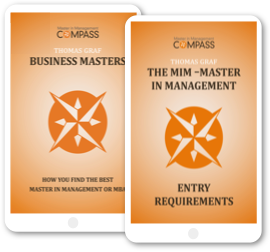What's the best Master in Management? What's the best business school? What's the best location for studying? The MIM Compass Forum is filled with questions like these reflecting a widespread uncertainty on how to select the right program.
The best Master in Management is the best Master in Management for YOU
According to the eBook Business Masters: How you find the best Master in Management or MBA, the following search strategy may be very effective.
- Change your perspective from general to subjective: Translate the question "What's the best MIM program?" into "What's the best MIM program for me?" to express a change of perspective that there is not one best program in the world but only the optimal program for you.
- Use your career goals as the guide for defining how your ideal program should look like. If you want to work in an investment bank after your MIM, for instance, your program should help you gain access to investment banks. If no investment bank comes to the campus to recruit graduates, maybe the program is not the best program for you. If you want to find a job in a specific country and the school has no experience in placing students from your country in the local job market, then the school may be the wrong school.
- Define your experience schools to specify your ideal program further. Do you want to study in the center of a metropole such as London or Madrid or do you prefer a more quiet landscape such as in St.Gallen or Fontainebleau?
- Define your resources such as financial resources and test results. If your GMAT test is clearly less than the average score of a school, you may still get in but the approach is risky and you may need alternatives (check the MIM Entry requirements survey to see the average scores). If the tuition fees and other costs needed for our studies are more than your budget, the program may not be the best program for you. Check the financial aid options before, however.
- Make a final shortlist of your ideal programs with two categories: one for your preferred schools that may include some risks (will you get in? will you be able to get financial aid?) and one for "save" schools.
- Visit the campuses to feel if this is the place where you wanna study for a year and you wanna spend your money.
Most of the information needed to build a short list of your ideal MIM programs can be found online or through contacting the schools. In addition, valuable sources of information are current MIM students and alumni. To gain access to them, you may ask a school's admission office or contact them through online networks. For gaining information on which employers recruit at a certain school, the school's website is your first address - but you can also try to gain information from the employers directly, through screening their career pages, contacting the HR department or connect with the company via job fairs or social media.









